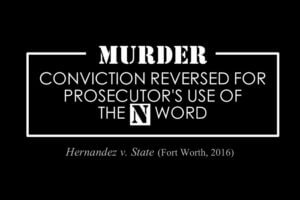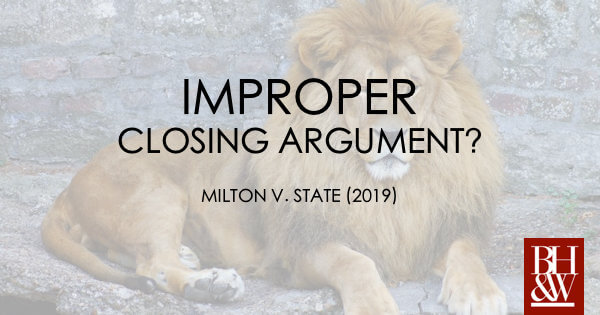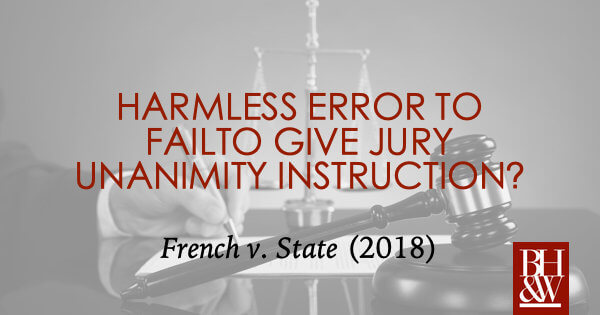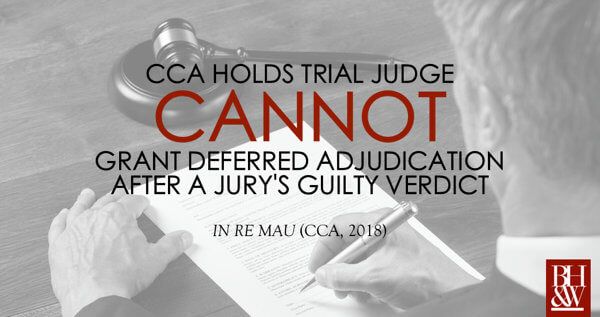Texas Prosecutor Uses the “N” Word During Closing Argument. Court of Appeals Reverses the Conviction.
 In December of 2014, Appellant Luis Miguel Hernandez was convicted of the murder of Devin Toler, an African-American man. During the trial, Appellant claimed self-defense, arguing that Toler attacked him and that by killing him, he was defending himself from the attack. The prosecution, however, presented evidence that Appellant provoked Toler by his words, some of them racial slurs. The actual words of the alleged racial slurs were never presented to the jury in the testimony of any witness or otherwise. However, during closing argument, the prosecutor said the following:
In December of 2014, Appellant Luis Miguel Hernandez was convicted of the murder of Devin Toler, an African-American man. During the trial, Appellant claimed self-defense, arguing that Toler attacked him and that by killing him, he was defending himself from the attack. The prosecution, however, presented evidence that Appellant provoked Toler by his words, some of them racial slurs. The actual words of the alleged racial slurs were never presented to the jury in the testimony of any witness or otherwise. However, during closing argument, the prosecutor said the following:
“What were the words of provocation? I’ll tell you what the words of provocation were. [Appellant] called Devin and his family ‘niggas.’ That’s what it was.”
The defense attorney promptly objected to the prosecutor’s use of the racial slur as it was inflammatory and outside the evidence in the case. Ultimately, (after a heated bench conference) the judge sustained the objection and instructed the jury to disregard the counsel’s comment, but did not specify which counsel or what comment the jury was to disregard. The defense did not move for a mistrial. The jury returned a verdict of guilty and sentenced Appellant to 14 years in prison.
See the majority opinion in Hernandez v. State (2nd Court of Appeals – Fort Worth, 2016)
What is a Proper Jury Argument?
On appeal to the Second Court of Appeals (Fort Worth), the Appellant challenged the judge’s failure to declare a mistrial after the prosecutor’s use of the “N” word. The court explained:
Proper jury argument falls into one of four areas: (1) summation of the evidence; (2) reasonable deduction from the evidence; (3) an answer to the argument of opposing counsel; and (4) a plea for law enforcement. Generally, error resulting from improper jury argument is subject to a harm analysis.
The appellate court held that not only were the prosecutor’s comments in using the “N” word error, but that the prosecutor’s comments constituted an “incurably prejudicial argument;” one that required a mistrial.
Is the “Incurably Prejudicial Argument” Waived if the Defendant Does Not Move for a Mistrial?
Texas courts have consistently held that to preserve error for an improper argument, the defendant must do 3 things:
- Make a timely and specific objection;
- Request and instruction to disregard if the objection is sustained; and
- Move for a mistrial if the instruction to disregard is granted.
Cockrell v. State, 933 S.W.2d 73, 89 (Tex. Crim. App. 1996), cert. denied, 520 U.S. 1173 (1997)
In this case, the defense satisfied 1 and 2, but did not move for a mistrial. The appellate court was then presented with the issue of whether the improper jury argument objection is waived if the defense does not move for a mistrial. Texas precedent says the issue can be waived for failure to move for a mistrial. But the court does not find this to be wise.
“Logically, this position makes no sense. An incurably prejudicial argument requires a mistrial. If the trial court does not grant the mistrial, the court has committed error that requires setting aside the conviction and re-trying the case. Respectfully, if the argument is so prejudicial that it has deprived the defendant of a fair trial, the injury is fundamental.”
The court provides further reasoning to depart from precedent, citing the tenuous political atmosphere surrounding race relations in America at the time of the trial.
The impact of the improper statement by the prosecuting attorney must be viewed in the context of the political atmosphere at the time of trial. The trial took place in early December 2014. On February 26, 2012, George Zimmerman, whose mother was from Peru, killed Trayvon Martin. Emotional discussions of Zimmerman’s ethnicity filled news commentary. Other killings made headlines. Among them was the death of Eric Garner while he was selling loose cigarettes in New York on July 17, 2014. The officer who killed him was Daniel Pantaleo. On August 9, 2014, Michael Brown was killed in Ferguson, Missouri. On August 11, 2014, Ezell Ford was killed in Los Angeles by two police officers, one of whom was Hispanic. And on November 23, 2014, twelve-year-old Tamir Rice was killed in Cincinnati, Ohio. Additionally, the Black Lives Matter organization was formed in 2013 in response to the acquittal of George Zimmerman in his trial for the murder of Trayvon Martin and was actively involved in protests nationwide.
With that, the Second Court held that the improper jury argument was not cured (and could not have been cured) by the judge’s “perfunctory” instruction to disregard and that the error was preserved for appeal. The court then reversed the case and remanded back to the trial court.
Dissent Agrees that the Error Was Prejudicial, But Would Not Depart From Precedent
Justice Sudderth dissented. She is not willing to depart from Court of Criminal Appeals’ precedent regarding the formal requirement to move for a mistrial. She writes:
Of all of the words in modern American English usage, including the slang and the vulgar, the “n-word” is of such infamy that it is generally referenced and understood only by its first letter. And with very few exceptions, such racially charged inflammatory language has no place in jury argument.
This is certainly the case when a prosecutor, using that language to secure a conviction, goes outside of the record to introduce it. Therefore, I agree with the majority that the prosecutor’s behavior was improper. It was inexcusable. It cannot be condoned. And the trial judge committed error in permitting it. Nevertheless, because we are constrained by precedent of the court of criminal appeals requiring preservation of this type of error, I am compelled to dissent.
It will be interesting to see whether the Court of Criminal Appeals will stick to their previous precedent or take this opportunity to change the law when it comes to an “incurably prejudicial argument” involving racial slurs.










